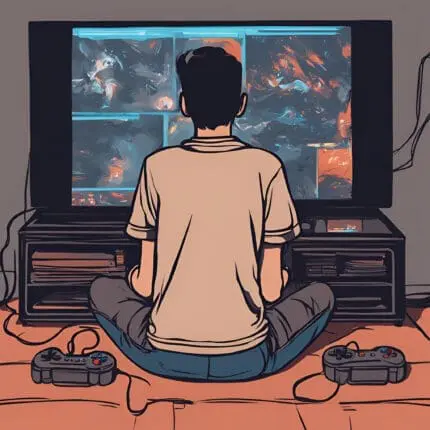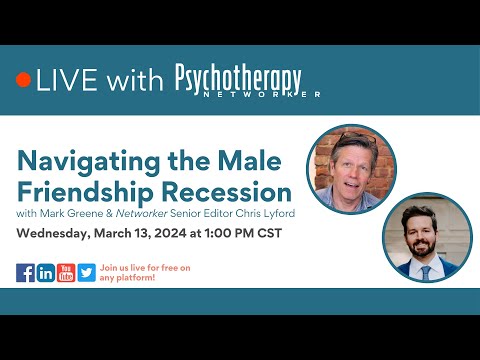Making friends isn’t easy. But amid unprecedented levels of anxiety, depression, and trauma, and in the middle of what the Department of Health and Human Services recently dubbed “an epidemic of loneliness and isolation,” it’s become a whole lot harder, especially for one population—young men. According to a recent study from PBS News, 20 percent of single men say they don’t have any close friends, and more than half of all men say they feel unsatisfied with the size of their friend groups.
Luckily, many therapists are aware of the problem, and some have even turned to unusual, innovative ways of tackling it. Licensed clinical professional counselor Kevin Lanham has been working with young men for almost a decade, particularly those he says often retreat into computer and video games. A self-proclaimed gamer himself, Lanham has been using his love of gaming to find common ground with these clients, and as an entrée to exploring the quality of their friendships and how they might be improved.
I sat down with Lanham to pick his brain about the state of men’s friendships, his unique approach to working with young men, and his best piece of advice for therapists looking to connect with clients in new, fun ways.
****
Chris Lyford: Recently, there have been a number of reports claiming men are in the middle of a “friendship crisis.” Do you agree with that assessment?
Kevin Lanham: In my practice, I definitely get the sense that men are struggling to make and maintain friendships. Lots of them come to me with symptoms of a lack of meaningful bonds. This might look like dissatisfaction at work, difficulties in romantic relationships, anxiety, depression, or low self-worth. When I ask these men who they spend time with outside of work and family, many don’t have an answer. And when we delve into that, I hear their grief around having had friendships in their earlier years and losing them, or shame around having difficulty connecting with other men.
I’m concerned about this global deprioritization of friendships happening early on in boys’ lives, because I believe that the state of our friendships corresponds with how we live our lives. We tell kids that they go to school to learn, not to make friends. But what about after graduation? Do we think about whether there are going to be people around us to connect with? Most young men feel like they can’t even ask this question; so much of the focus is on getting a job or making money or finding a romantic partner, not where we can find friends.
CL: Are you noticing any generational differences in how men are thinking about friendship?
Lanham: Although most of the men I see are on the younger side, I do work with some who are 50 and older. My older clients say their friendship problems have gotten worse over time. But some have gotten used to not having friends, and I find myself educating them about the importance of friendship in later life. My younger clients, however, are watching their friends fall away in real time, during the transitions from high school to college, and from college to the working world. Many of them understand how important friendship is but struggle to deepen their connections, both in person and online.
CL: That brings me to one of your specialties: working with gamers. How’d you get interested in that?
Lanham: In college, I got really interested in group dynamics and online video gaming communities. But in graduate school, none of my classes were talking about online communities. When I told other therapists I had an interest in working with young male gamers, I kept bumping into the stereotype that young men are difficult to work with, or don’t have much to talk about, or much access to their emotions. But when I began work as a therapist, I found the opposite to be true—when I asked the right questions. When my male clients mentioned a video game they’d been playing, I didn’t just ask, “Well how long do you play, and how do we get you to stop?” I’d ask, “What do you play? Who do you play with? What do you get out of it?”
The more we explored this topic, the more I found that a lot of them were gaming for the same reasons people do any activity they enjoy: they liked gaining a sense of mastery over something. Or if they were struggling with some problem in their life, it helped them gain a sense of control over their emotions. But that wasn’t all I found: a lot of the guys I worked with also told me that games were a source of connection—but also that they were also struggling to move from an activity-based connection to a deeper level of communication, perhaps in real life. That’s where therapy comes in.
CL: So what’s your process? What sorts of questions do you ask clients to help them explore and deepen those connections?
Lanham: I start with open-ended questions like, “How do you spend your time online?” Then I’ll ask, “Who are some of the people you usually play with? Did you meet them online, or did you meet somewhere else and then start playing online?” I ask questions like, “What are you passionate about?”
These are basic questions, but they’re important ones that many therapists overlook. A couple years ago, I was working with a college student who’d supposedly been suffering from insomnia. He’d been to a bunch of sleep specialists and had been put on medication. I learned that when he was up late, he’d play video games. When I asked him what he’d been playing, he told me he’d been playing Final Fantasy XIV, which is this massive multiplayer online game that was huge in Japan. He told me he was also part of a Japanese gaming guild. See where this is going? When he was up at night, he was on Japanese time! It wasn’t that he couldn’t fall asleep; being awake meant he could play with his guild buddies. That discovery totally shifted the treatment. He didn’t need sleep medication; he needed help finding other ways of connecting that didn’t have negative consequences.
CL: It sounds like many young men, though—gamers included—do struggle to make and maintain friendships. What recommendations do you give them?
Lanham: Well, I don’t usually rush into looking for a solution. That’s something I tell the therapists I supervise: before taking a solution-focused approach, just remember how meaningful the therapeutic relationship can be. For your clients, especially those struggling to make friends, feeling a bond with you can provide the kind of experiential learning that gives them the confidence to try to connect with people outside of therapy. So I start by just being curious and trying to connect with them. I find that if you begin by recommending solutions, they don’t really stick, whereas creating a connection with the client can be healing right away.
CL: In my own life, I’ve found it difficult to make friends outside of settings like college and work. I’ve also had some important friendships fall away over the years as our paths diverged. Does that sound familiar?
Lanham: I think those are really common struggles. I was an RA in back in college, and when I left, I felt the loss of this sense of community. I kept thinking, Why aren’t there dorms for adults? It seems kind of silly, but a dorm isn’t just an apartment, it’s a place where there’s a community leader, and events, and opportunities for people to connect.
Regarding friendships falling away, I tell my clients in their 20s and 30s not to start from scratch if they don’t have to. Sometimes our relationships lapse or change, but there are ways to deepen those friendships if we want to. It takes time and effort and consistency, but it can happen. At the same time, the stakes can feel very high when you’re trying to make friends, even as an adult.
I do a lot of parts work, and I believe that inside most of us there’s a five-year-old who’s terrified that he’ll have nobody to play with. Being able to name and acknowledge this part of ourselves is important. It’s not a question of “How do I get 35-year-old me to go to the local game store?” It’s “How do I encourage a five-year-old to go back to the playground after nobody played with them yesterday?” We’re too prone to tell ourselves, “Just go. Don’t be a baby,” instead of soothing and connecting with that child part and letting them know they’re loved.
CL: What’s your best advice for therapists working with men struggling with friendship issues?
Lanham: In my experience, many men come to therapy when they’re hungry for relationships but don’t know where to begin. So just keep in mind that modeling friendship through your relationship can make all the difference. That may sound like basic knowledge, but I think it takes a mind-shift for some therapists. Really being interested in your client’s life is different from just wearing your clinical, diagnostic hat. Balancing the two is the art and science of therapy. Clients can feel when someone’s actually interested in them and what they’re talking about. Tap into that spark of interest in your client’s life, because when you do, then they’ll open up more, be more vulnerable, and you’ll have some really amazing conversations.
Chris Lyford
Chris Lyford is the Senior Editor at Psychotherapy Networker. Previously, he was assistant director and editor of the The Atlantic Post, where he wrote and edited news pieces on the Middle East and Africa. He also formerly worked at The Washington Post, where he wrote local feature pieces for the Metro, Sports, and Style sections. Contact: clyford@psychnetworker.org.












